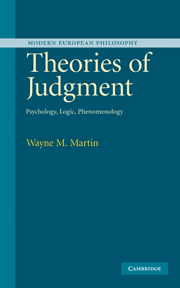Book contents
- Frontmatter
- Contents
- List of figures
- Acknowledgments
- Principles of citation
- Introduction: the faces of judgment
- 1 The psychology of judging: three experimental approaches
- 2 Judgment as synthesis, judgment as thesis: existential judgment in Kantian logics
- 3 The judgment stroke and the truth predicate: Frege and the logical representation of judgment
- 4 Heidegger and the phenomeno-logic of judgment: methods of phenomenology in the dissertation of 1913
- 5 Elements of a phenomenology of judgment: judgmental comportment in Cranach's Judgment of Paris
- Bibliography
- Index
Introduction: the faces of judgment
Published online by Cambridge University Press: 22 September 2009
- Frontmatter
- Contents
- List of figures
- Acknowledgments
- Principles of citation
- Introduction: the faces of judgment
- 1 The psychology of judging: three experimental approaches
- 2 Judgment as synthesis, judgment as thesis: existential judgment in Kantian logics
- 3 The judgment stroke and the truth predicate: Frege and the logical representation of judgment
- 4 Heidegger and the phenomeno-logic of judgment: methods of phenomenology in the dissertation of 1913
- 5 Elements of a phenomenology of judgment: judgmental comportment in Cranach's Judgment of Paris
- Bibliography
- Index
Summary
This is a book about judgment, and about the long history of attempts to understand it. It is said that one can learn something about a community by considering how it adjudicates disputes. Is judgment reached by majority vote? by contests of strength or the casting of runes? by deferral to elders or experts? In each case the procedure of judgment is revealing: revealing about the world of the judges and revealing about the sources of authority within the community. The same is true of individuals: we can hope to understand something important about ourselves (perhaps ultimately about the kind of beings we are) if we can understand what it is to judge. The task of judgment is everywhere in human life, whether in sorting the mail, casting a vote, or salting the soup. But what do we do when we judge? What process do we undergo? What stance do we adopt toward ourselves and others? What authority do we invoke and submit ourselves to?
To embark on an investigation of these matters we require some initial characterization of judgment. What range of phenomena is to be investigated under this rubric? I have no definition to offer, but rather begin with some tautologies and examples.
Judgment is what judges do. Obviously this is not a definition (it is blatantly circular and obviously incomplete), but it has the virtue of directing our attention from the outset to the idea that judgment is in some sense an activity of cognitive agents.
- Type
- Chapter
- Information
- Theories of JudgmentPsychology, Logic, Phenomenology, pp. 1 - 13Publisher: Cambridge University PressPrint publication year: 2006

